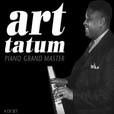(This piece originally appeared in Sound Collector in 2003 and is republished by permission.)

Art Tatum, Piano Grand Master, Proper Records (Properbox 60) (UK), four CDs, 2003
Is sheer astonishment enough? That's the question posed by Art Tatum.
Tatum sounds not like a great pianist but rather like two or three great pianists playing together. What boggles the imagination is not that a mere human being can play the piano this well but rather that anyone can do anything this well. You can't quite believe what you are hearing, but there it is.
When Tatum plays "Stardust," he's not playing "Stardust," he's playing Art Tatum. You don't "hear" the lyrics. No one else has run "Tiger Rag" or "Indiana" through so many harmonic shifts or found so many alleyways. He ventures further out on the harmonic ledge than anyone except maybe Charlie Parker. To say nothing of his sheer speed. Tatum is throwing fireballs with both hands, implacable as the Sphinx, infallible as the pope. Listen upon these works and despair.
This four-CD set covers the front half of Tatum's recording career, from 1934 to 1951. His famous "Willow Weep for Me" is here, in its definitive version. Yes, he can play ballads. His softness is softer than anyone's, with delicate filigree of articulation, every note distinct. Then he turns on the burners. Tatum takes "I Wish I Were Twins" at a tempo way, way up from Fats Waller's, and he drives it home with the most advanced left-handed Harlem stride ever recorded. Holy mackerel.
Is sheer jaw-dropping astonishment enough? Can you have too much of this? Maybe, and maybe. New York composer/pianist Joel Forrester said, "A friend of mine gave me a CD of infinite Art Tatum. He thought he was doing me a great favor, but now I just want the thing out of my head."
The overall effect is astonishment itself, or outright surrender. Sometimes the only possible response is laughter. If you play piano, you may want to close the wooden cover on the keys and never try again.
To criticize Tatum is to expose your own covetousness. You could say Tatum lacks deep, soulful feeling, but as the critic Martin Williams wrote about Tatum, "to expect that would be to miss the point." When you hear the precision jeweler Tatum doing session work behind the rough and ready Big Joe Turner, of all people, the results are downright peculiar. So, OK, maybe don't match him with Big Joe Turner.
You could say that Tatum isn't a great ensemble player, and you might have a point, but is it his fault that no one this side of Coleman Hawkins could keep up with him? Then again, listen to the tracks by the Art Tatum Trio, with Slam Stewart on bass and Tiny Grimes on guitar. Whereas, say, the Nat King Cole Trio lulls you into an expansive cocktail mood, the Tatum Trio spins your head around with lightning exchanges. Their explosive "I Got Rhythm" is a wonder of modern science.
You could remind the class that Tatum was not a composer, so his achievement is a degree of magnitude lower than that of Duke Ellington or Thelonious Monk. But that's a reach outside Tatum's scope of activity. In discussions of pianists, Tatum, who disliked being referred to as a "jazz pianist," has to be disqualified. Who is the best pianist, except for, of course, Art Tatum?
Wait, maybe Tatum's limit is that he's a trick pianist par excellence. But no, here comes an austere version of "I Got a Right to Sing the Blues," just the melody served straight up, so he can do that too, if he wants. Tatum wins again.
Maybe the best way to cope with this phenomenon is to sit back helplessly and let those fizzing glissandos wash over you. Bask in the glow of his "Someone to Watch Over Me." Feel those notes pouring out of the piano. That is, until Tatum is ready to pulverize you again with that left hand.
After he recorded these sides, Tatum had a two-year hiatus from the studio. He returned to record a huge amount of material for the Verve label in the last three years of his life. Art Tatum died in 1956, at age 47.
If you make it to the fourth disc of this set, and if you aren't pleading for mercy, you'll hear Tatum working his magic in front of an audience at the Crescendo Club in Los Angeles in 1950. For the sake of your own grip on reality, you might be grateful you weren't there.
